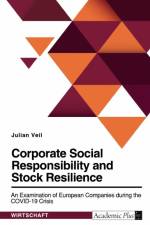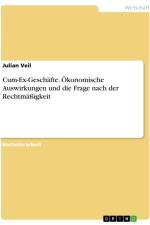von Julian Veil
48,95 €
Master's Thesis from the year 2022 in the subject Business economics - Investment and Finance, grade: 1,0, University of Frankfurt (Main) (Institute for Management and Microeconomics), language: English, abstract: In December 2019, the world confronted the outbreak of the SARS-CoV-2 virus, leading to the global spread of COVID-19. The subsequent pandemic, declared by the World Health Organization on March 11, 2020, triggered unprecedented economic uncertainty, causing substantial upheaval in financial markets worldwide. Major indices, including the S&P 500 and DAX 30, recorded significant losses within a short span.This paper examines the role of corporate social responsibility (CSR) in influencing stock performance during the COVID-19 crisis, focusing on European companies. CSR, defined as "the responsibility of enterprises for their impact on society" by the European Commission, has been suggested as a potential factor in protecting shareholder wealth during crises. The study aims to assess whether companies engaged in CSR activities exhibit better resilience during economic downturns.The research question driving this study is straightforward: Can engagement in corporate social responsibility shield shareholder wealth from the adverse effects of an economic crisis, mitigating tail risk for European companies? To answer this question, the study analyzes the performance of 428 European companies during the COVID-19 crisis (February 20 - March 23, 2020) and the subsequent recovery period (March 24 - December 31, 2020).The methodology involves cross-sectional regressions, considering performance measures such as abnormal and raw stock returns, as well as idiosyncratic and stock volatility. CSR performance is approximated using Refinitiv's environmental, social, and governance (ESG) scores for 2019. The analysis includes a set of control variables covering risk, accounting metrics, and corporate governance measures.This study contributes to the existing literature by exploring the relationship between CSR engagement and stock performance, specifically in the context of the COVID-19 crisis. The subsequent sections delve into the literature review, data description, methodology, empirical results, and a detailed discussion of the findings.



